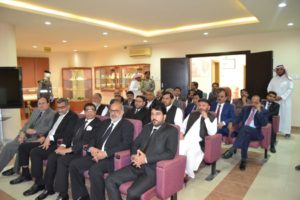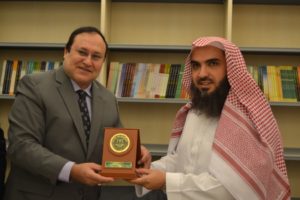 A delegation of Pakistani judges is visiting KSA for obtaining first-hand experience of various dimensions and intricacies of the Saudi criminal system. Here is a briefed account of the details which are being sent to us on daily basis by Mr. Sohail Khan, Lecturer Shariah Academy Pakistan:
A delegation of Pakistani judges is visiting KSA for obtaining first-hand experience of various dimensions and intricacies of the Saudi criminal system. Here is a briefed account of the details which are being sent to us on daily basis by Mr. Sohail Khan, Lecturer Shariah Academy Pakistan:
The delegation of Pakistani judges visited the complex of criminal court of Riyadh with the objective to obtain first-hand experience of various dimensions and intricacies of the Saudi criminal system.
The complex consists of the state-of-the-art building spread over multiple stories, equipped with security cameras and IT equipment. Every proceeding was being recorded visually and vocally, monitored live by the chief of court. The delegation met with the honorable justice Dr. Abdul Karim bin Saleh Al-muqdim, where his lordship briefed the delegation about judicial system of Saudi Arabia, jurisdiction of the court of criminal proceedings, appellant court, and the supreme Court. Stating that the Criminal Court of Riyadh is the trail court where criminal proceedings are initiated.
The appeal of these cases lies with the appellant court of the province. Its pertinent to mention here that, the Royal Kingdom of Saudi Arabia has 13 provinces, so each province has an appellant court. Speedy trail is one of the features of the Saudi judicial system. As a normal criminal proceeding may not take more than two months, whereas in serious and heinous crimes the maximum time may reach upto one year but not more. The court work is divided into categories, the first category, tries serious crimes, heard by a bench of three judges, whereas the rest are heard by a single judge. 30-40 cases are allocated to the bench per month whereas the workload of single judge is double that number. The learned chief specifically apprised the participants, in response to their questions, that the right of the accused to cross examine the witnesses produced against him through his defense lawyer is ingrained in the Saudi judicial system as a basic principle. In response to a question raised by a participant, the delegation was informed, that not only the judgments are written by printed and made available to the parties and general public. For this purpose, there is a special wing in the system.
 It is worth mentioning here, that the bench cannot delay the announcing a judgment if the judge(s) has reached to a certain conclusion after the facts has been established and the proceedings completed.
It is worth mentioning here, that the bench cannot delay the announcing a judgment if the judge(s) has reached to a certain conclusion after the facts has been established and the proceedings completed.
The delegation than was divided into three groups, each group attended separate court and observed live proceedings at various stages of the trail. The delegates were able to see live, recording of evidence, recording of statement of accused, and announcement of judgment. They also observed that, there were accused on bail during the trail, whereas, accused in custody were also produced in court, providing them an opportunity to attend proceedings. These accused were made to sit in separate glass chambers duly hand cuffed. The accused on bail received a gist of the court order on their mobile phone. The court duly confirmed from these accused on bail the receipt of the order in open court. The convicting bench made the convict understand regarding his right of appeal with the limitation of thirty days. Since the Saudi legal system has got separate court for the execution of the verdict of the court, therefore, the accused was referred to these courts for execution of the verdict. The delegation also observed that in each case the adjournment was for a single day only. Another group observed the attempt of the accused to delay the process by accruing the services of three lawyers on three hearings. This attempt was noted by the bench and brought on record with warning issued to the accused against any delay. The case was adjourned for a  single day only. Furthermore, the delegation observed with interest that, in almost all the cases pertaining the possession of narcotics, the accused openly confessed the guilt of possession of narcotics but denied indulgence in narcotics trade as alleged by the prosecution. It was probably due to the knowledge, that punishment for the trade of narcotics is far savior than possession. Now the question before the court for decision was were the accused was involved in the trade or not for which evidence was summoned. The senior judge of the bench in each group was kind enough to invite the participants to their chambers whereby they answered their questions. The most remarkable feature of the Saudi legal system as noted by the participants, that whenever there is a compromise in case it is only regarding haq khas which is right in personum but this accused can still be convicted for violation of haq e aam which is nearer to right in rem because every criminal act is considered as a crime against society as well. The delegation felt that this aspect of the Saudi legal system is conducive to the peace prevailing in the county.
single day only. Furthermore, the delegation observed with interest that, in almost all the cases pertaining the possession of narcotics, the accused openly confessed the guilt of possession of narcotics but denied indulgence in narcotics trade as alleged by the prosecution. It was probably due to the knowledge, that punishment for the trade of narcotics is far savior than possession. Now the question before the court for decision was were the accused was involved in the trade or not for which evidence was summoned. The senior judge of the bench in each group was kind enough to invite the participants to their chambers whereby they answered their questions. The most remarkable feature of the Saudi legal system as noted by the participants, that whenever there is a compromise in case it is only regarding haq khas which is right in personum but this accused can still be convicted for violation of haq e aam which is nearer to right in rem because every criminal act is considered as a crime against society as well. The delegation felt that this aspect of the Saudi legal system is conducive to the peace prevailing in the county.
The visit acquainted the learned Pakistani judges with working of Islamic law, its interpretation and implementation in the criminal proceedings.

